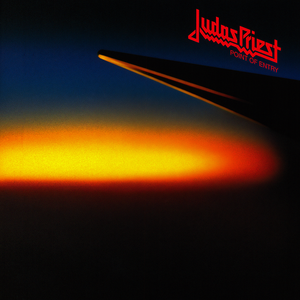Published on Mar 17, 2005
In 1981, the world’s airwaves and arenas were ripe fruit for the
boys in leather. Judas Priest was one of the fastest rising bands
in the world by then, thanks to the incessant repetition of the two
hits from their previous album
British Steel, and a successful (albeit abysmal) live album.
MTV was saturated with their videos and spiked leather wristbands
were becoming de rigueur for teenage headbangers from Osaka to
Ossipee.
Little by little, each successive JP album was showing more
creativity and more restraint, usually without sacrificing the
power that drives their style. With
Point Of Entry it almost feels like the tried too hard for a
more melodic sound than ever before, and overshot the mark, which
results in a lot less of the raw aggression that flavors a typical
JP album. Some stylistic missteps aside, they succeed in crafting a
much different landscape than any previous (or future) album. Many
fans that were waiting for
British Steel II were understandably dismayed and thus
dismissed it. But for those who give it a fair chance, this album
has a lot to offer.
This disc has gotten a bad reputation, with fans accusing it of
being too soft. I can see where this comes from. The album overall
does lack the powerful edge of their previous work. There’s no
“Ripper” or “Steeler” on this disc. Nothing that grinds as hard as
anything on
Hell Bent For Leather or
Stained Class, that’s for sure. Still, I think the criticism
is a bit unfair.
Point Of Entry rocks plenty hard at times, especially on the
opening track “Heading Out To The Highway.” This is one of their
best songs from any album, with its muscular guitar hook and
shout-along chorus.
When their experimentation does pay off, it does so very well.
One thing they do here is making better use of their rhythm section
(Ian Hill and Dave Holland) than ever before, letting them do more
than just provide backbone. Frankly I’d never paid much attention
to them, lost as they always were in the mayhem created by
guitarists K.K. Downing and Glenn Tipton. Here they take the
emphasis off a continuous guitar riff propelling every song. The
guitars are there, but they wisely deemphasize them, particularly
on “Desert Plains,” a mid-tempo power ballad that turns down the
guitars a notch, and rides along on a galloping bass line
accompanied by some unusual tom-tom work. The more complex rhythmic
theme takes the focus off the guitar, which gives it a sonic
texture that fits in well with the stark atmosphere of the lyrics.
“Solar Angels” is another departure stylistically. Lots of guitars,
but this time heavily processed to sound like wings.
A couple of songs fall flat. “You Say Yes” starts out well, with
a bluesy boogie riff, but disintegrates into a repetitious chorus,
which they repeat to the point of nausea. “Hot Rockin” has a lot of
promise until you realize it’s “Hell Bent For Leather” redux. One
of the stranger songs, “All The Way,” sounds like something
straight from The Kinks songbook. If you have access to both songs,
listen to “All The Way,” then spin The Kinks “Destroyer” and see if
you don’t hear a similarity. Results may very, but I had to raise
an eyebrow myself when I played them back-to-back.
This album is one I have been a vigorous defender of for many
years, because of how good the really good songs are. All summed
up, the good tracks overshadow the not-so-good ones. It’s a mixed
bag to be sure, but it has a certain charm that has grown on me
over the years. And some of the tracks can’t be dismissed. “Desert
Plains”, “Heading Out To The Highway” and Troubleshooter” are as
good as anything they’ve ever done. Granted it sounds unlike most
of their catalog due to its more melodic feel, but I still enjoy it
more than most of their post-’70s work.
